"Viajar es descubrir que todo el mundo está equivocado acerca de otros países." – Aldous Huxley
For an American preparing for a trip to Cuba, no había escasez de escenarios que corría por mi cabeza.
¿Cómo se viaja a través de un comunista, «off-limits» country be?
How would Cubans react when they found out that I was from the USA?
Would the entire country be one giant, militarized island guided under the iron fist of one of the 20th century’s most infamous dictators?
I spent 6 weeks traveling Cuba from end to end, but not even 6 días para refutar la mayoría de los estereotipos que tenía del país. En lugar de las grandes, scary communist soldiers I found some of the happiest & friendliest people I’ve ever met. Instead of trade embargo-induced poverty, I found a resilient, although humble equality across the board. In place of anti-American sentiment, I found welcoming hugs, exciting stories, and optimistic world views.
Habiendo dicho eso, there were definitely some stereotypes that I had about Cuba that turned out to be true, but that’s for a different article. Aquí está mi lista de los estereotipos de Cuba que fueron totalmente destrozadas:
Estereotipo: Cuba es peligroso
I almost can´t believe it when I say it, but it´s true – Cuba is one of the safest countries I´ve ever been to. Por lo menos me sentía de esa manera todo el tiempo que estuve allí.
But I’m not the only one. De acuerdo con la United Nations Office on Drugs and Crime, Cuba is one of the safest countries in the western hemisphere, with only Canada & Chile having a lower homicide rate.
This is, no doubt, a result of the Cuba being a communist police state. No sólo están los cubanos asustó de prisión por la comisión de crímenes despiadados, but also it’s just not in their blood to violently rob & steal with their socialist values. Also, Castro básicamente se apoderó de todas las armas de fuego por parte del público en general cuando La Revolución took over, which effectively squashed crimes committed with firearms.
On a less official note, there are just so many people, of all ages & backgrounds in the street at all times, that I always felt «safe in numbers» & never alone & vulnerable. Es difícil tener miedo de caminar por una calle a las 11 pm cuando se está riendo grupos de niños pequeños esquivando, y saludando a old ladies sitting in their rocking chairs in the middle of the sidewalk.
VERDICT: FALSE
Estereotipo: Cubans Don’t Like Americans
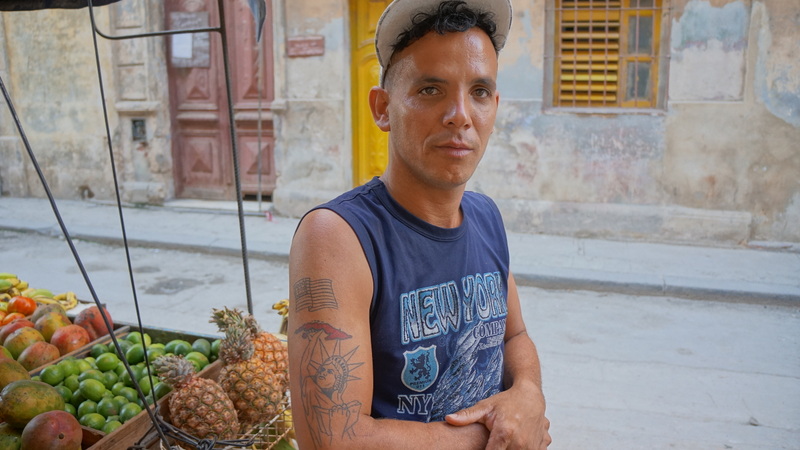
He has a tattoo of Statue of Liberty holding up Cuba – Tiene un tatuaje de La Estatua de La Libertad sosteniendo a Cuba.
This one is obvious, derecho?
I mean, our two countries haven’t had any formal relations for over 50 años. The USA is the country that has kept Cuba in the dark & isolated from the rest of the world. We have cut off Cuba from outside help & denied them access to basic products – OF COURSE Cubans hate Americans!
WRONG.
Cubans understand better than anyone that a government’s actions do no necessarily represent the ideas of a populace. Nunca escondí una vez que yo era de los Estados Unidos, and every time I told someone where I was from, the conversation instantly shifted up a gear with a hug, handshake, or smile. Cubans have wanted our countries to be friends for years, are pleased to make your acquaintance, & are excited for the future. Not to mention, most of the Cubans you’ll meet have family in the US, and they always want to tell you about it.
VERDICT: FALSE
Estereotipo: Cuba es una aburrida, communist country
Communism. The big, bad word of Cold War’s yesterday. It instantly stirs up negative connotations, & brings up images of a bleak society that stifles creativity & fun.
Cuban life is anything but dull.
Did you forget that Cuba is in the Caribbean? The architecture is vibrant & colorful. The people are loud & sensual. The days are steamy & tropical & the nights never ending.
En realidad, music can be heard everywhere, at all hours. No se sorprenda si usted da vuelta una esquina y ve a un grupo de personas bailando en la calle como si se pavimentó ser una pista de baile. From the beaches, to the alley baseball, to the Malecón y los innumerables juegos de dominó en la acera - Los cubanos son los amos de la auto entretenimiento.
Yes the Cuban government is communist, therefore controls the media, es propietaria de empresas de telecomunicaciones, & other businesses such as restaurants, hotels, & resorts, but the island is far from the totalitarian, militarized state that many believe Cuba to be. People respect the law of the land, and I never once saw government/military officials ordering people around & stepping in to dictate normal, every-day life like I did in Vietnam.
VERDICT: FALSE
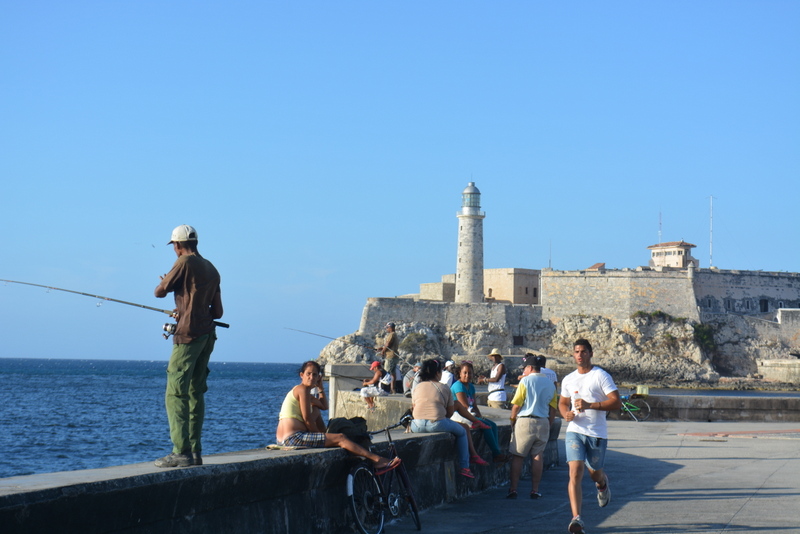
There is always something interesting happening at the Malecón in Havana – Siempre sucede algo interesante en El Malecón en La Habana
Estereotipo: Fidel Castro is evil
Take your time to research Señor Castro and you may come to the same conclusion that I did – he’s not a bad guy. Sure the humans rights records under his dictatorship have been iffy at best, and there’s no denying the man is as stubborn as a mule, but you can’t really blame what he stood/stands for.
Before Fidel Castro, Cuba was run by US-backed & corrupt dictator Fulgencio Batista. El país era básicamente la mitad del tabaco / caña / finca de café-americana controlada, one-half gambling, bootlegging, prostitution, money-laundering playground for the Mafia with no rules nor accountability.
Castro wanted true independence for his country, and after ousting Batista (who fled the country with $300 million), he nationalized all US banks & companies, and redistributed all the land & resources back to the Cuban people. He has survived army invasions, countless CIA assassination plots, and over 50 years of trade embargo. Cuba hasta hoy sigue siendo un "David contra Goliat" ejemplo de desafío al imperialismo estadounidense en América Latina.
Does that sound evil to you? Sounds pretty badass to me.
VERDICT: OPINIÓN (But I say false)
Estereotipo: Cubans are uneducated
First off, Cuba has a 99.8% literacy rate.
Secondly, one of the greatest things about Cuba’s socialist system, is that higher education is totally free. A Cuban can get their college degree, their master’s degree, y even become a doctor for completely free in Cuba.
It isn’t just the availability of education, which most Cubans do take advantage of, but the vivacity & eagerness to consumer information & learn about the rest of the world that characterize most Cubans.
At first, I was amazed by the random lady at the coffee shop’s knowledge of politics & history. Entonces empecé a darme cuenta de que es algo normal para los cubanos a ser muy educados, well-spoken & informed.
VERDICT: FALSE
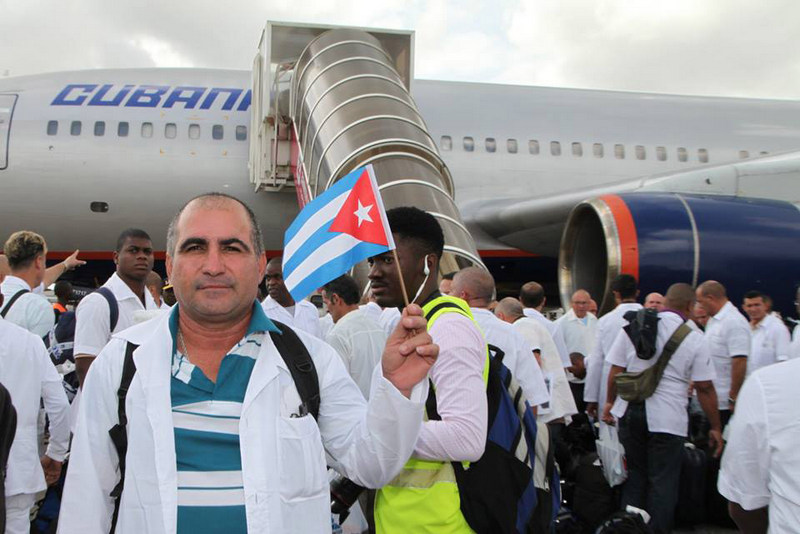
A group of 165 Cuban doctors went to Africa to combat Ebola – Un grupo de 165 doctores Cubanos fueron a Africa para combatir la Ebola
Estereotipo: Cubans live in poverty
There is little to no extreme poverty in Cuba. This is something else that I realized actually works about Cuba’s socialismo. The redistribution by the government, the strong sense of community & family, and Cubans’ resilience & ingenuity to make things work, result in most everyone having enough. They certainly don’t have a lot, but enough to get by.
The filthy squalor & desolate poverty that I have seen in many countries, including the United States, I never saw in Cuba. I never once saw a homeless person. There are plenty of people asking for money, and people wearing tattered clothes & shoes, but they always seemed to have a place to lay their head at night. One Cuban guy told me, “Si ves alguna persona durmiendo en la calle, es porque escoje dormir alli” (If you see a person sleeping in the streets it’s because they choose to sleep there).
Extended Cuban families usually live in the same house, expand the house as the family grows, and have minimal utility expenses. además, the government provides a stipend to each household to help buy basic food products such as rice, eggs, & oil.
VERDICT: FALSE
Estereotipo: La mayoría de los cubanos vender drogas
Ever since Al Pacino played Tony Montana in the infamous Scarface, la gente ha asociado cubanos con los traficantes de drogas. De hecho, me could't informarle sobre los cubanos la venta de drogas en Miami, pero en Cuba casi no hay narcotraficantes. Por que no? Bien, I´m no expert, but I´d be willing to bet it has something to do with the fact that there are virtually no drugs in Cuba.
Castro cracked down on all drugs when he took over in 1959. Sanciones extremadamente duras para el tráfico de drogas continúan hoy en día donde se puede servir a un tiempo serio para tratar de argot. Also, drug traffickers from Latin America try to avoid Cuba as U.S. drug patrol ships & aircraft comb the waters south of Florida.
VERDICT: FALSE
Not What You Expected, Right?
So you can see, my time in Cuba was truly an eye-opener. Es imposible no tener expectativas & certain ideas built up in your mind about a particular country before you go there. Nearly every country has stereotypes, images, or a reputation that precedes it. Pero sólo se necesita realmente viajar a ese país para darse cuenta de que la mayoría de los preconceptos negativos son parcial o completamente equivocado.
There were definitely more shattered stereotypes than the average trip, pero también me encontré algunos de los stereotypes that I had about Cuba to be true. Check out my next article for my thoughts on those.
Do yourself a favor and travel to Cuba! Cultura cubana & life have so much to offer, and it is one of the most unique countries I’ve ever been to. Pero por ahora, por favor dígame acerca de algunas de sus estereotipos de Cuba en la sección de comentarios. ¿Acaso este artículo le sorprenderá? ¿Cómo se imagina el país de Cuba para ser?
Check out my 1-3 week itineraries & 4-6 week itineraries for more information on what to do in Cuba!

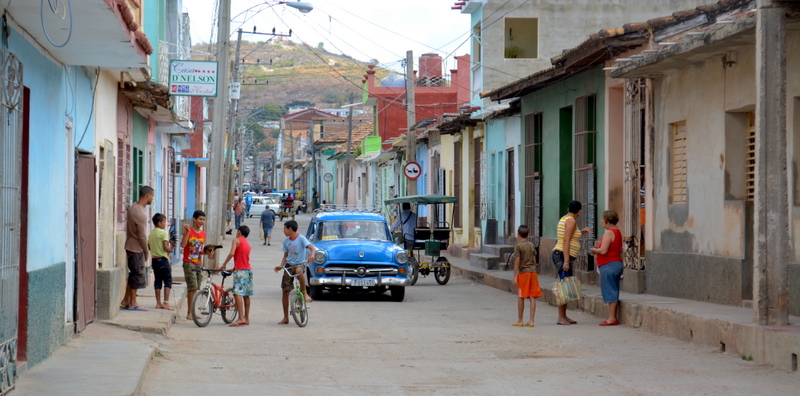
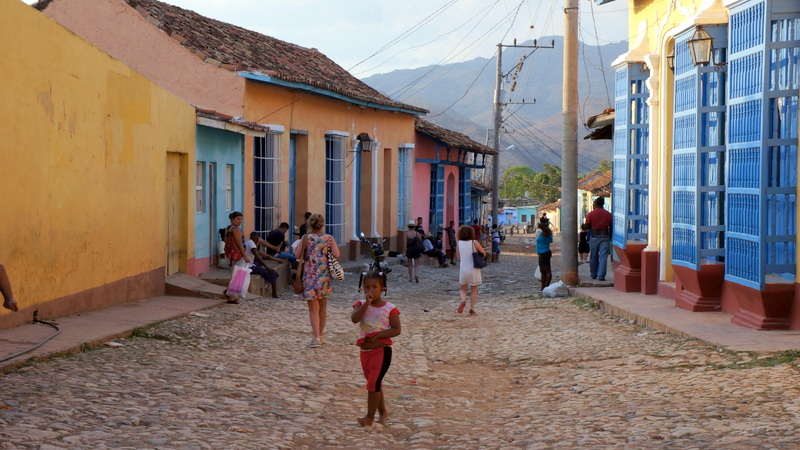
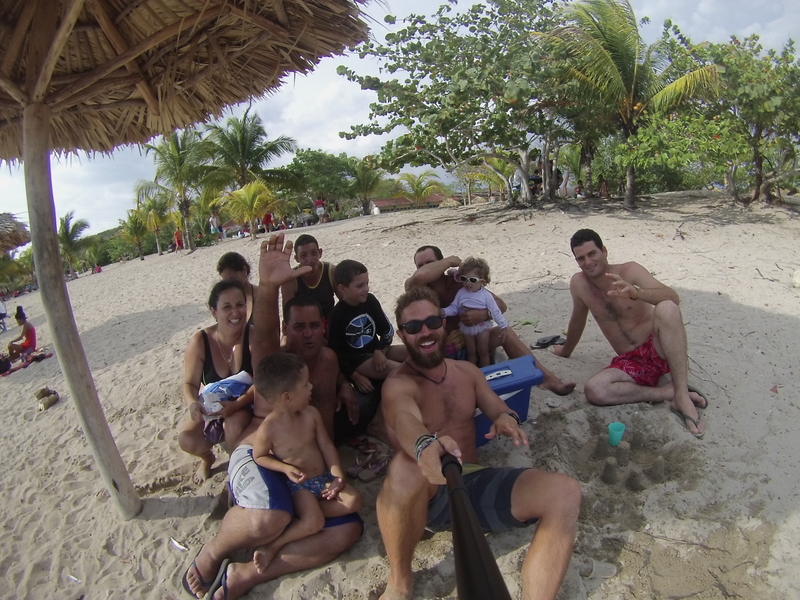
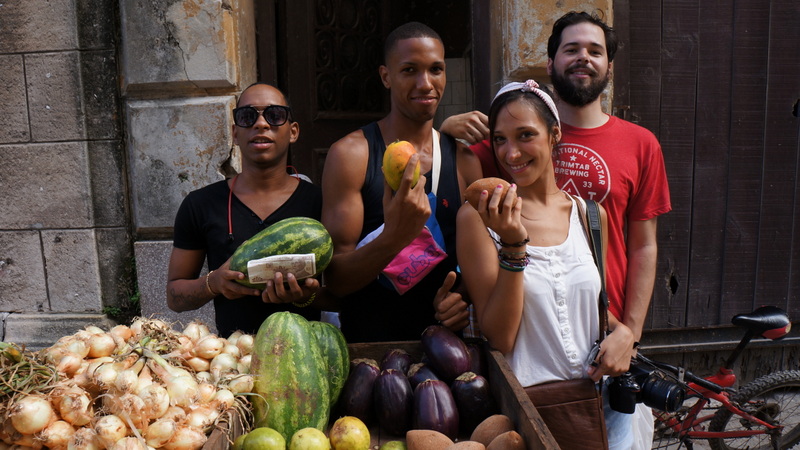
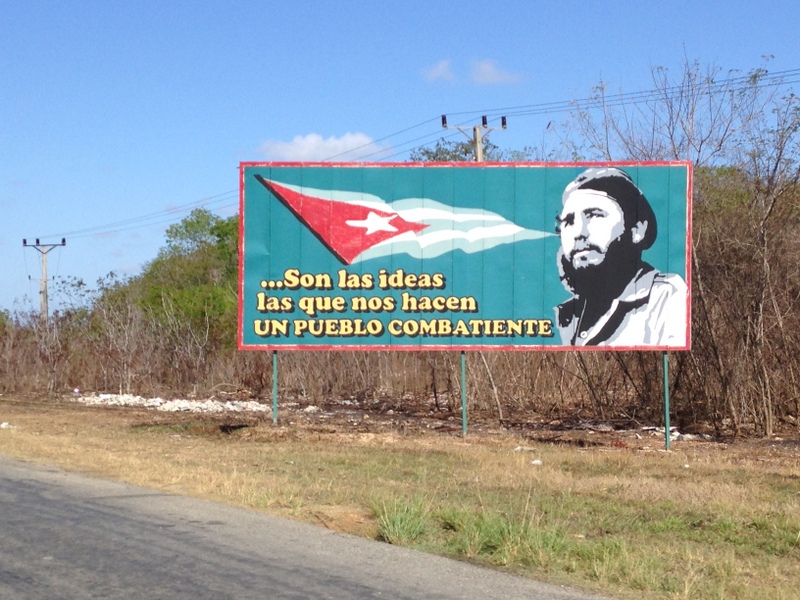
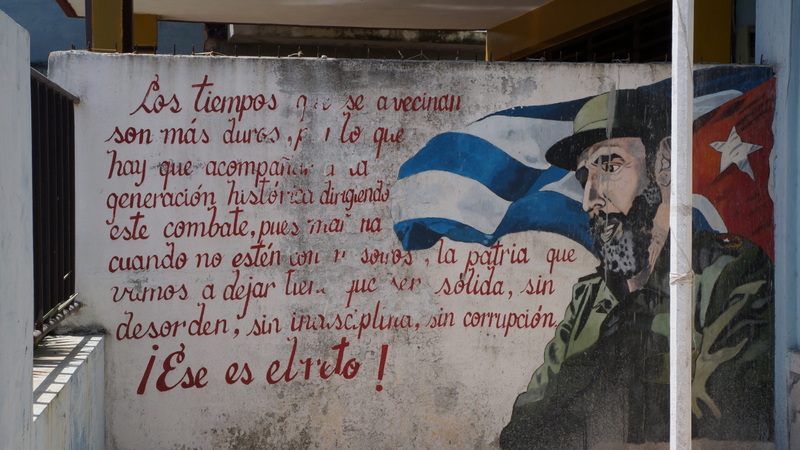
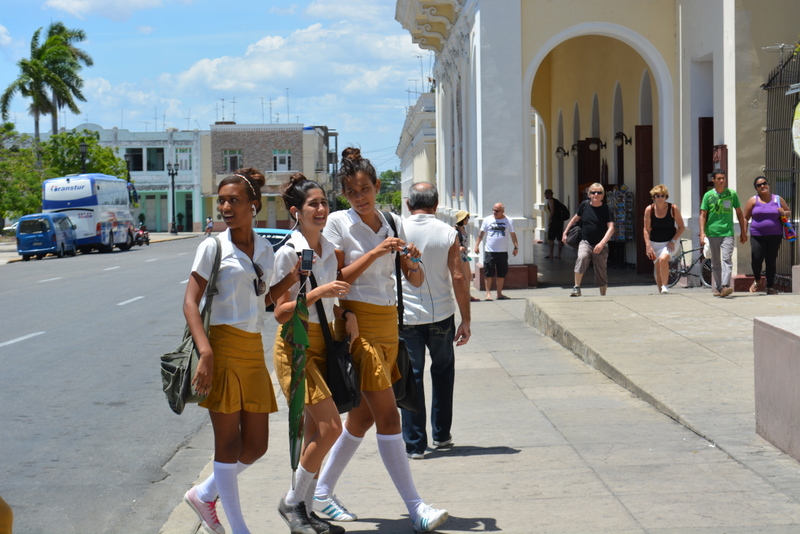

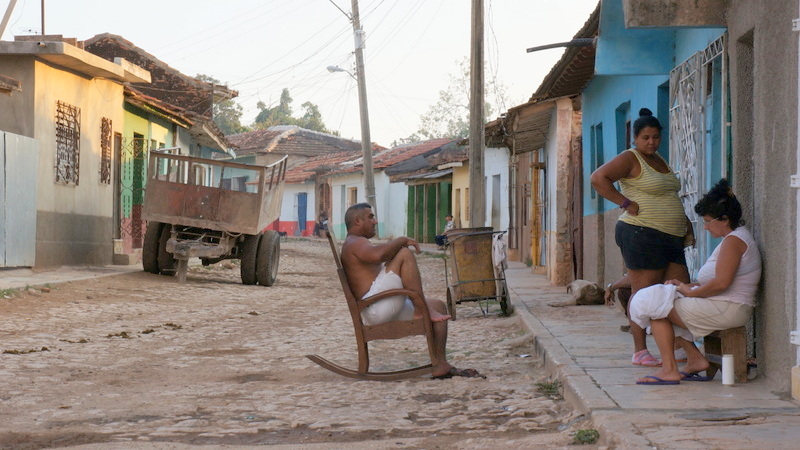
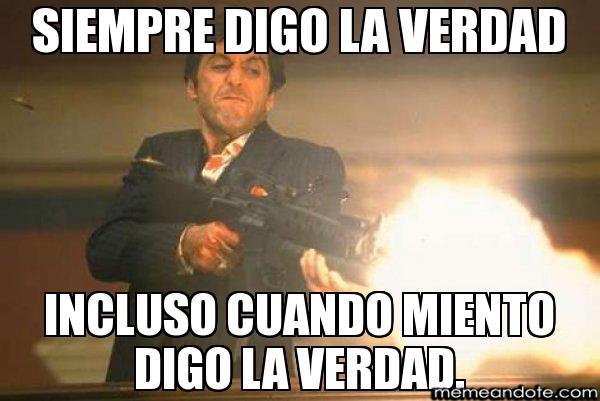
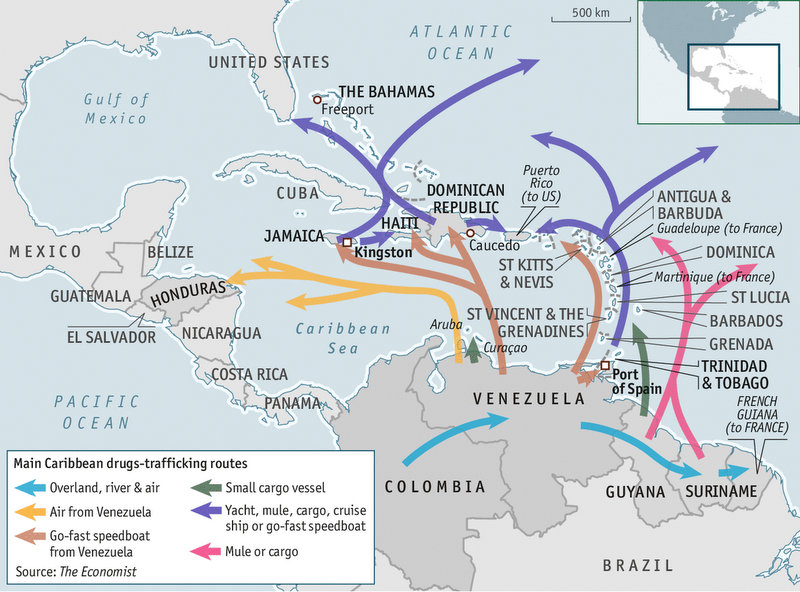
Siendo la edad que tengo, Recuerdo algunos de los terribles violaciónes de los derechos humanos realizadas por Castro. Yo tenía trece años cuando el mundo se enfrentó a la crisis de los misiles de Cuba. Tom acaba de conocer a un piloto cuyo padre fue hecho para el trabajo en los campos de caña de azúcar durante dos años, lejos de su familia. Castro había enviado soldados a pedir a los ciudadanos que querían ir a los EE.UU., este hombre dijo que lo hizo. Un camión llegó, lo llevó al campo y lo mantuvo allí. Por último, que llegó a viajar a los EE.UU.. Fue trasladado a Nueva York sin hablar Inglés, no tenía dinero, y sabía que nadie. Él fue capaz de sobrevivir, casarse, tener una familia, hacer una buena vida para ellos, y enseñar a sus hijos la importancia de una libertad. Para este dia, él no puede entender por qué la gente no va a funcionar por su animada capucha y querer tomar dádivas del gobierno. No es un fan de Castro ni sus creencias comunistas / socialistas.
En cuanto a la crisis de los misiles, Cuba pasó a la URSS para la ayuda después de los EE.UU. invadieron Cuba en un intento de assinant Castro & derrocar a su gov't, y poner otro gobierno títere corrupto en el poder. Who is could they have turned to for protection from an imperialist bully 90 miles away? Yea, Castro’s his human rights record has been questionable for sure – its I think it’s because he’s worried about the Cubans’ exposure to pro-American information & sparking a counter-revolution within the country.
That’s actually prob what happened to Tom’s friend’s father. He was effectively «taught a lesson», and then deported to the US to «eliminate the threat.» Definitely sketchy & inhuman practices but Castro doesn’t trust any US actions or motives, so he takes extremes to limit their influence.
I don’t agree with much that he has done either Becky, but my trip to Cuba has helped me understand why he took certain drastic steps to protect his system and country. Gracias por tu comentario reflexivo!
Vado, lo que es una gran experiencia!!!!! Fui a Cuba en 1991. Estábamos tal vez el primer grupo que se le permita al país desde los EE.UU.. Me enamoré de la gente que conocí. Cuando regresé y traté de describir mi experiencia con Cathy y las chicas sólo pude llorar lme un bebé!!!!! Si alguna vez vuelvo a Toccoa me gustaría mucho compartir experiencias. Dios te bendiga, mi amigo!!!! Roy
Sé que la experiencia de Roy. Lloré varias veces cuando yo estaba allí, ver todas las repercusiones de primera mano de lo que el embargo comercial ha hecho a Cuba. Es difícil de describir, pero imposible de olvidar. Me encantaría volver a ponerse al día con usted pronto – póngase en contacto con mi padre!
Sin embargo, otra gran lectura . Me gusta mucho su sitio Ford
Gracias Jason. Sigue leyendo a lo largo de!
Pingback: Using Travel to Alter Stereotypes - The Potomac Reporter
Pingback: ¿Qué es Cuba realmente como? Los verdaderos estereotipos de Cuba - ¿Dónde está el Gringo?
Gran artículo de Ford! Siempre es agradable leer más gente escribiendo sobre experiencias positivas en Cuba y mostrando al mundo que este es un país increíble para visitar con una rica historia. Seguro que hay diferentes caras de la historia, y es fácil criticar a Fidel y Cuba por su pasado, pero no se puede negar el país estaba acorralado en una esquina. Incluso hoy en día usan los efectos de las sanciones económicas impuestas por los EE.UU. que los impactos de sus acuerdos comerciales, sin embargo, se las han arreglado para proporcionar tanto en términos de educación y salud a sus ciudadanos.
De todos modos sin ser demasiado político, gran post y seguir promoviendo Cuba! No puedo esperar a volver!
Gracias por leer & comentando Jules! ¿Cómo podría no cantar las alabanzas de este lugar increíble! No era sólo otro país para mí, pero en verdad una experiencia que me cambió y cómo pienso. Usted puede imaginar lo impactante que es para un estadounidense – dijo tu novia nunca llegar emocional? Porque sé que hice Seguro.
Como dijiste, no quiero ser demasiado político aquí, pero estoy seguro que espero que las cosas sigan mejorando entre nuestros dos países. La parte difícil será la reforma de la obsoleta & políticas escandalosas, mientras que preserva su rica cultura & logros de la Revolución.
Ahora que he experimentado de primera mano Cuba, esta es una lectura muy interesante. Gran parte de ella es muerto en, sin embargo, el «Cubans live in poverty» parte definitivamente no es lo que he vivido y discutido en gran detalle con muchas personas. estoy de acuerdo, hay muy pocas personas sin hogar, pero pobre es el estado general de los Populis. El ingreso promedio es de $ 20 / mes, hecho que va más allá en peso nacional, pero hay una razón por su mercado negro prospera, y muchas personas hacen todo lo posible para recibir la espalda de patada de tomar turistas lugares, refiriéndose a los lugares, introducción a la gente, etc.. Una gran y muy desafortunado ejemplo es, nos dieron una manicura y pedicura por el costo total de $1 que fue realizado por un contador con un grado de cuatro años, porque ella tiene más dinero haciendo las uñas. Visitamos algunos residencia en el lugar (no casas particulares– que son básicamente superiores cubanos de clase media) y me costaría mucho decir que no estaban luchando. Muchas personas llenas bañeras con agua, porque el agua que fluye a través de tuberías consistente simplemente no sucede. La comida es un desafío para muchos, así, aunque esto ha mejorado mucho en los últimos años. La gente de Cuba son, sin duda ingeniosa, y han hecho un gran trabajo con lo que tienen. Espero que la futura ayuda a traer aún más a ellos. Excepto reggeton.. Ellos ya tienen un montón de que 🙂
Charlotte – I agree with you that Cubans don’t have a lot, but I stand by my claim that they don’t live in extreme poverty. By many first world standards, Cubans are «poor,» however there is a difference between being poor and living in poverty. You don’t see Cubans living in cardboard boxes on the street. You don’t see Cubans digging through the trash to find a half-eaten corncob. I’m sure somewhere in Cuba that could exist, but you just don’t see things like that in common Cuban life. Ok, so some Cubans store water in their bathtub. That sounds like bad plumbing to me, not extreme poverty. At least they have drinkable water.
The average salary of the Cuban, well-educated or not, and their lack of products are travesties that must change. yo, like you, share optimism that it will! But about that reggaeton, No creo que nunca va a cambiar 🙂
Pingback: Increíblemente detallado Itinerario de un mes para Cuba - Hippie En Tacones
Pingback: Radical Democracy? – Hola